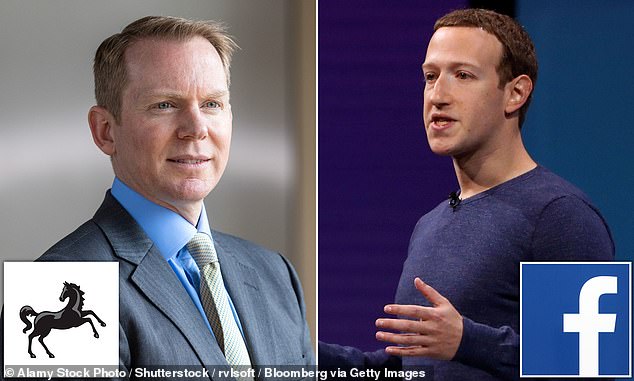Lloyds Bank this weekend fired a salvo at Facebook-owner Meta, slamming it for failing to stop a ‘Wild West’ surge in online shopping scams. Britain’s biggest retail bank – which has 26 million customers – blasted the social media giant for enabling so-called ‘purchase’ frauds.
The banking group claimed two-thirds of the scams start on Meta-owned platforms, which also includes Instagram.
Banks and insurance groups have been frustrated for years that social media companies are not made to pay their fair share of compensation to victims for frauds hosted on their platforms.
But it is highly unusual for a lender like Lloyds to take aim at an individual tech firm like Meta.
The intervention puts Lloyds Banking Group boss Charlie Nunn at loggerheads with Facebook tycoon Mark Zuckerberg.
Face-off: Lloyds Banking Group boss Charlie Nunn and Meta executive chairman Mark Zuckerberg
British banks have previously urged ministers to tackle online financial scams amid concerns that criminals are using Facebook and Google to place fraudulent advertisements with impunity.
The failure of internet giants to check the authenticity of digital ads has led to a surge of scams, they claim. These include ‘brand cloning’, where criminals impersonate legitimate businesses to dupe victims into handing over their savings. Purchase fraud tends to target younger consumers who are tricked into paying for sought-after items that don’t actually exist.
Victims are lured by the offer of a cheap deal – often advertised on social media – and then asked to send money from their own secure online bank account direct to the seller via a transfer system known as faster payments.
However, this provides very little protection when things go wrong.
The scam is a small but growing part of online fraud, which now accounts for 40 per cent of all crime and costs £7 billion a year, according to latest government figures.
The number of purchase frauds has soared by 40 per cent since the start of the pandemic to over 117,000 cases in 2022, according to the UK Finance trade body. It coincided with a boom in online shopping, more time spent on social media and shortages of certain goods caused by supply chain issues.
Lloyds, whose brands include Hailfax and Bank of Scotland, estimates that someone falls victim to the scam on a Meta-owned platform every seven minutes, costing consumers £27 million this year alone.
The average amount lost by the victims of purchase scams is around £570. Clothes, trainers, gaming consoles and mobile phones are among the most common goods being falsely advertised for sale.
Lloyds said it reimburses ‘the majority’ of victims and has invested ‘hundreds of millions of pounds’ in security systems to beat the scammers.
But refunds don’t address the emotional trauma of being a victim of fraud or stop the flow of money to organised crime, it added.
‘Social media has become the Wild West of online shopping in recent years, with very few checks in place to verify who is selling what,’ said Liz Ziegler, fraud prevention director at Lloyds Banking Group.
The Government’s new national fraud strategy allows banks more time to slow down suspicious payments. But Ziegler said banks couldn’t fight the ‘epidemic of scams’ alone.
‘It’s high time tech companies stepped up to share responsibility for protecting their own customers,’ she said.
‘This means stopping scams at source and contributing to refunds when their platforms are used to defraud innocent victims.’
An amendment to the long-delayed Online Safety Bill requires social media firms to prevent paid-for fraudulent adverts, regardless of whether the ads are controlled by the platforms or an intermediary. It followed pressure from consumer groups, charities and the banking industry who claimed the Government’s approach to tackling online fraud was ‘flawed’.
But critics say the proposals still don’t go far enough. ‘Fraudsters don’t just pay for adverts or create fraudulent content that fits within the scope of the Bill,’ said a banking industry source. ‘The exclusion of online marketplaces like Facebook’s is therefore a significant loophole.’
Campaigners say only the threat of fines will force the social media companies to act.
‘Without penalties there’s nothing in it for them to stop the scams from happening,’ said consumer champion Baroness Altmann. She fears the Government is ‘absolutely terrified of upsetting the tech companies’ and of being seen to clamp down on the free market.
James Daley, founder of consumer campaign group Fairer Finance, said social media sites had become ‘a gateway for fraudsters’.
‘Firms like Meta have a clear responsibility to step up and protect their users,’ he said. ‘But if past experience is anything to go by, it’s unlikely these firms will do much if they don’t have to.
‘The Government announced plans to introduce new protections last year, but these have now been kicked into the long grass again.’
Meta said purchase fraud was ‘an industry-wide issue’ with scammers using ‘increasingly sophisticated methods’ to defraud people ‘in a range of ways, including email, text and offline’.
A spokesman said: ‘We don’t want anyone to fall victim to these criminals which is why our platforms have systems to block scams. Financial services advertisers now have to be authorised by the Financial Conduct Authority.’
The Department for Science, Innovation and Technology was approached for comment.



















